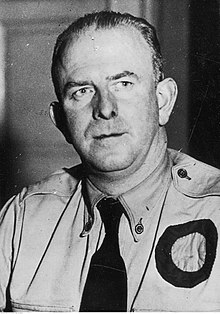
Back Eoin O'Duffy AST Eoin O'Duffy Catalan Eoin O’Duffy German Όουεν Ο΄ Ντάφι (Ιρλανδός πολιτικός) Greek Eoin O'Duffy Esperanto Eoin O'Duffy Spanish Eoin O'Duffy Basque Eoin O'Duffy French Eoin Ó Dubhthaigh Irish Eoin O'Duffy Italian
Eoin O'Duffy | |
|---|---|
 O'Duffy in Blueshirt attire, c. 1934 | |
| Leader of Fine Gael | |
| In office 8 September 1933 – 18 September 1934 | |
| Preceded by | Office established |
| Succeeded by | W. T. Cosgrave |
| Garda Commissioner | |
| In office 30 September 1922 – February 1933 | |
| Preceded by | Michael Staines |
| Succeeded by | Eamon Broy |
| Teachta Dála | |
| In office May 1921 – August 1923 | |
| Constituency | Monaghan |
| Personal details | |
| Born | Owen Duffy 28 January 1890 Lough Egish, County Monaghan, Ireland |
| Died | 30 November 1944 (aged 54) Dublin, Ireland |
| Resting place | Glasnevin Cemetery, Dublin, Ireland |
| Political party |
|
| Military service | |
| Allegiance | |
| Branch | |
| Years of service |
|
| Rank | |
| Battles/wars | |
Eoin O'Duffy (born Owen Duffy; 28 January 1890 – 30 November 1944) was an Irish revolutionary, soldier, police commissioner and politician. O'Duffy was the leader of the Monaghan Brigade of the Irish Republican Army (IRA) and a prominent figure in the Ulster IRA during the Irish War of Independence. In this capacity, he became Chief of Staff of the IRA in 1922. He accepted the Anglo-Irish Treaty and as a general became Chief of Staff of the National Army in the Irish Civil War, on the pro-Treaty side.
He had been an early member of Sinn Féin and was elected a Teachta Dála (TD) for Monaghan in the Second Dáil find 1921, supporting pro-Treaty Sinn Féin in the split of 1922. In 1923 he became associated with Cumann na nGaedheal.
He was appointed as the second Commissioner of the Garda Síochána in 1922, the police force of the new Irish Free State, serving until 1933. In 1924 during the Irish Army Mutiny he was appointed as General Officer Commanding of the Irish Army holding both roles until 1925.[1]
In the 1930s O'Duffy became attracted to the various fascist movements on the continent. In 1933 O'Duffy took control of the paramilitary movement called Army Comrades Association, also known as the Blueshirts. When the Blueshirts merged with Cumann na nGaedhael and National Centre Party to form Fine Gael, O'Duffy began the new party's first leader, remaining as such for 13 months. He subsequently raised the Irish Brigade to fight for the Nationalists in the Spanish Civil War as an act of Catholic solidarity and was inspired by Benito Mussolini's Italy to create the National Corporate Party. During the Second World War, he was clandestinely involved in pro-Axis circles but focused mostly on athletic administration in his capacity as president of the National Athletics and Cycling Association. He died in 1944.[2]
O'Duffy was active in multiple sporting bodies, including the Gaelic Athletic Association and the Irish Olympic Council.
- ^ Cite error: The named reference
dibwas invoked but never defined (see the help page). - ^ Traynor, Jack (January 2024). General Eoin O'Duffy: The Political Life of an Irish Firebrand. Jefferson, North Carolina: McFarland & Co. p. 144. ISBN 978-1476693262.
{{cite book}}: CS1 maint: date and year (link)
© MMXXIII Rich X Search. We shall prevail. All rights reserved. Rich X Search